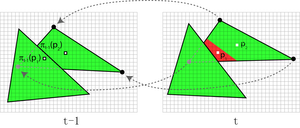Information
- Publication Type: Other Reviewed Publication
- Workgroup(s)/Project(s):
- Date: 2010
- Booktitle: SIGGRAPH Asia 2010 Courses
- Location: Seoul, Südkorea
- Conference date: 15. December 2010 – 18. December 2010
- Keywords: shadows, temporal coherence, real-time, rendering
Abstract
Temporal coherence (TC), the correlation of contents between adjacent rendered frames, exists across a wide range of scenes and motion types in practical real-time rendering. By taking advantage of TC, we can save redundant computation and improve the performance of many rendering tasks significantly with only a marginal decrease in quality. This not only allows us to incorporate more computationally intensive shading effects to existing applications, but also offers exciting opportunities of extending high-end graphics applications to reach lower-spec consumer-level hardware.This course aims to introduce participants to the concepts of TC, and provide them the working practical and theoretical knowledge to exploit TC in a variety of shading tasks. It begins with an introduction of the general notion of TC in rendering, as well as an overview of the recent developments in this field. Then it focuses on a key data structure - the reverse reprojection cache, which is the foundation of many applications. The course proceeds with a number of extensions of the basic algorithm for assisting in multi-pass shading effects, shader antialiasing, casting shadows and global-illumination effects. Finally, several more general coherence topics beyond pixel reuse are introduced, including visibility culling optimization and object-space global-illumination approximations. For all the major techniques and applications covered, implementation and practical issues involved in development are addressed in detail.
In general, we emphasize "know how" and the guidelines related to algorithm choices. After the course, participants are encouraged to find and utilize TC in their own applications and rapidly adapt existing algorithms to meet their requirements.
Additional Files and Images
Weblinks
No further information available.BibTeX
@inproceedings{scherzer2010d,
title = "Exploiting Temporal Coherence in Real-Time Rendering",
author = "Daniel Scherzer and Lei Yang and Oliver Mattausch",
year = "2010",
abstract = "Temporal coherence (TC), the correlation of contents between
adjacent rendered frames, exists across a wide range of
scenes and motion types in practical real-time rendering. By
taking advantage of TC, we can save redundant computation
and improve the performance of many rendering tasks
significantly with only a marginal decrease in quality. This
not only allows us to incorporate more computationally
intensive shading effects to existing applications, but also
offers exciting opportunities of extending high-end graphics
applications to reach lower-spec consumer-level hardware.
This course aims to introduce participants to the concepts
of TC, and provide them the working practical and
theoretical knowledge to exploit TC in a variety of shading
tasks. It begins with an introduction of the general notion
of TC in rendering, as well as an overview of the recent
developments in this field. Then it focuses on a key data
structure - the reverse reprojection cache, which is the
foundation of many applications. The course proceeds with a
number of extensions of the basic algorithm for assisting in
multi-pass shading effects, shader antialiasing, casting
shadows and global-illumination effects. Finally, several
more general coherence topics beyond pixel reuse are
introduced, including visibility culling optimization and
object-space global-illumination approximations. For all the
major techniques and applications covered, implementation
and practical issues involved in development are addressed
in detail. In general, we emphasize "know how" and the
guidelines related to algorithm choices. After the course,
participants are encouraged to find and utilize TC in their
own applications and rapidly adapt existing algorithms to
meet their requirements.",
booktitle = "SIGGRAPH Asia 2010 Courses",
location = "Seoul, S\"{u}dkorea",
keywords = "shadows, temporal coherence, real-time, rendering",
URL = "https://www.cg.tuwien.ac.at/research/publications/2010/scherzer2010d/",
}

 image
image paper
paper
